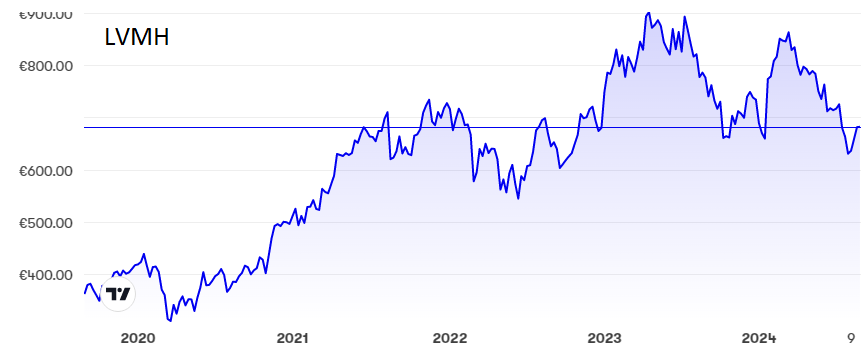A stock with considerable upside potential and limited downside?
Overseas investing expert Rodney Hobson examines a company where the picture is mixed. Buy, sell or hold?
28th August 2024 10:45
by Rodney Hobson from interactive investor

There is a saying that you can make any set of statistics mean whatever you want them to mean. So it can be with company results, when which figure you choose decides whether the company is doing better or worse. A prime example was second-quarter figures issued by luxury goods maker LVMH Moet Hennessy Louis Vuitton SE (EURONEXT:MC).
- Invest with ii: What is a Managed ISA? | Open a Managed ISA | Transfer an ISA
Firstly, let us look at revenue. This was down in the second quarter compared with the same quarter last year, by 1.1% to €21.2 billion, but up by 1.4% from a disappointing first quarter. However, if you consider sales on a comparable basis, revenue grew 1% year on year. Better news? Perhaps not. Organic growth was 3% in the first quarter, so comparable sales growth has slowed sharply.
How about the more important figure, profits? Net profit was down 14% to €7.3 billion in the first half of 2024, so that was more bad news.
The company itself put on a brave face, saying the results showed LVMH’s “remarkable resilience” in an uncertain geopolitical and economic environment. Then it further clouded the issue by claiming that it had seen growth in Europe and the US, Japan had recorded double-digit revenue growth and the rest of Asia reflected strong growth in spending by the Chinese.
- Stockwatch: should you act on the rebound in this fallen star?
- Insider: bosses back up targets with own purchases
Investors are entitled to be a little sceptical. If there were such positive sales figures, where did the slowdown occur? One feels that the board was not being entirely frank and that some caution is required in assessing the assurance that “the group approaches the second half of the year with confidence, and will count on the agility and talent of its teams to further strengthen its global leadership position in luxury goods in 2024”. Figures speak louder than words.

Source: interactive investor. Past performance is not a guide to future performance.
Looking at different categories, the picture is very mixed. Apparently we drank more champagne during Covid but have partly kicked the habit since, although we are still consuming more of the expensive fizzy stuff than we did back in 2019. The Chinese are drinking less Hennessy cognac and Americans are returning to brandy only cautiously. Overall, wines and spirits sales fell 9% in the first half with profits slumping 26% in this division.
Comparable sales of fashion and leather goods, the largest sector in terms of sales and profits, edged higher yet profits slipped 6%. Perfumes and cosmetics pushed revenue up 6% but profits stagnated. Watches and jewellery saw revenue fall 3% and profits drop 19%. One gets the feeling that margins are very much under pressure.
The results speeded up a slide that had been going on since mid-March, when the shares topped €870. However, there was then a sharp recovery from a 20-month low at €621 and the current price is around €670, where the price/earnings ratio is a bit toppy at 24.4 and the yield is an unexciting 1.9%.
- Sign up to our free newsletter for share, fund and trust ideas, and the latest news and analysis
- An American brand I’d still buy shares in
Yet the group has a glittering array of desirable brands, including Bulgari, Givenchy, Dior, Tiffany and Louis Vuitton, that will remain in demand, so the board may be right in suggesting that things will get better soon.
Hobson’s choice: Luxury items had phenomenal growth over many years leading up to the pandemic, particularly to the newly emerging Chinese middle and upper classes, but sales have tailed off. An upward trajectory is likely to be resumed but that may take some time and is likely to be much more sedate for the foreseeable future.
The downside for the share price looks limited, while the upside has considerable promise, so the overall recommendation is to buy. Investors should be aware that 75-year-old chief executive Bernard Arnault and his family own just under half the shares and a majority of the voting rights. He has run the company well but when he dies there could be a squabble between his five children, who all work in the business.
Rodney Hobson is a freelance contributor and not a direct employee of interactive investor.
These articles are provided for information purposes only. Occasionally, an opinion about whether to buy or sell a specific investment may be provided by third parties. The content is not intended to be a personal recommendation to buy or sell any financial instrument or product, or to adopt any investment strategy as it is not provided based on an assessment of your investing knowledge and experience, your financial situation or your investment objectives. The value of your investments, and the income derived from them, may go down as well as up. You may not get back all the money that you invest. The investments referred to in this article may not be suitable for all investors, and if in doubt, an investor should seek advice from a qualified investment adviser.
Full performance can be found on the company or index summary page on the interactive investor website. Simply click on the company's or index name highlighted in the article.
Disclosure
We use a combination of fundamental and technical analysis in forming our view as to the valuation and prospects of an investment. Where relevant we have set out those particular matters we think are important in the above article, but further detail can be found here.
Please note that our article on this investment should not be considered to be a regular publication.
Details of all recommendations issued by ii during the previous 12-month period can be found here.
ii adheres to a strict code of conduct. Contributors may hold shares or have other interests in companies included in these portfolios, which could create a conflict of interests. Contributors intending to write about any financial instruments in which they have an interest are required to disclose such interest to ii and in the article itself. ii will at all times consider whether such interest impairs the objectivity of the recommendation.
In addition, individuals involved in the production of investment articles are subject to a personal account dealing restriction, which prevents them from placing a transaction in the specified instrument(s) for a period before and for five working days after such publication. This is to avoid personal interests conflicting with the interests of the recipients of those investment articles.